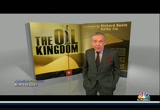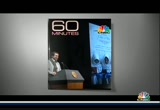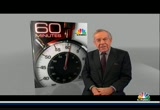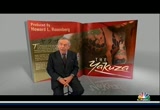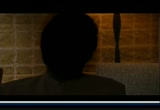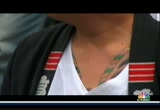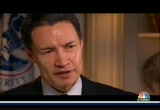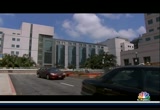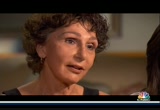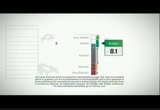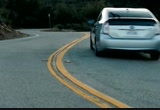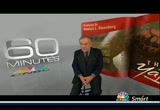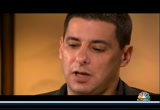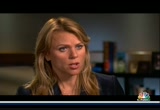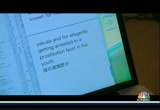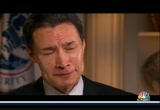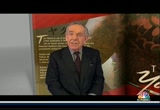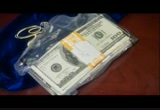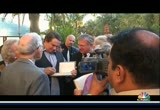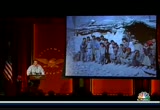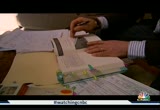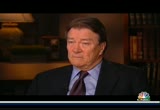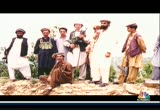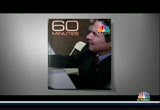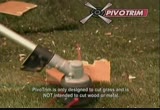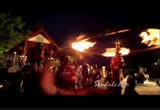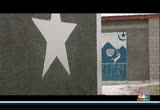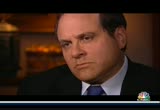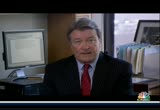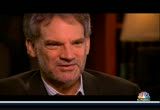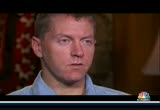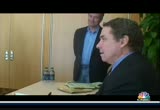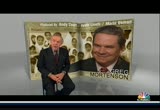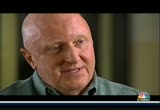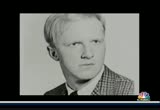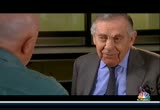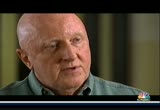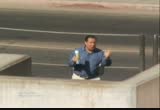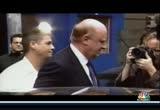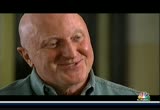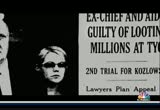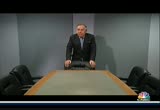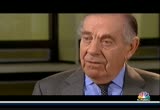tv 60 Minutes on CNBC CNBC September 3, 2012 11:00am-12:00pm EDT
11:00 am
the market. that's this edition of 60 minutes on cnbc. i'm morley safer. thank you for joining us. [ticking] [ticking] >> it is the mark of the yakuza: ornate, full-body tattoos that cover the members of the japanese mob. so how did one of their most notorious godfathers get into america and jump to the front of a line for a lifesaving liver transplant? this reporter found out and says it may cost him his life. >> as he was leaving and getting in his car, he said, "that"-- you know, "that--that goddamn american jew reporter. i want to kill him." [ticking] >> greg mortenson's book three cups of tea is a publishing phenomenon that has made him a celebrity, a cult-like figure on the lecture circuit, and inspired people to give nearly $60 million
11:01 am
to his charity, and it all began with one simple story. >> it's a beautiful story, and it's a lie. >> we wanted to talk to mortenson about that and some other things, but he didn't want to talk to 60 minutes. >> steve kroft. >> nice to meet you. >> how you doing? >> thanks. >> got five minutes for us today? >> um... [ticking] >> we wondered how the man who could whistle up a corporate jet on a whim... >> let's rock. >> or throw a $2 million birthday party was doing in his reduced circumstances. what's it like to go from king of the world to prisoner number 05a-4820 serving 8 to 25 years behind bars? >> in my wildest imagination, when i would project myself into my late 50s and early 60s, where i would be or what i would be doing, if i make a list of 100 different places or 100 different things, here would never make that list. >> welcome to 60 minutes on cnbc. i'm morley safer.
11:02 am
in this edition, we look at stories of crime, punishment, and what money can buy. first, the high-stakes world of japanese organized crime, where big dollars saved the life of an infamous gangster. then we investigate how best-selling author and philanthropist greg mortenson used some of the assets of his multimillion-dollar charity. and finally, we talk to dennis kozlowski, the former ceo who once made headlines for illegal corporate excess. we begin with the yakuza, japan's not-so-secret version of the mafia. american law enforcement keeps a close eye on the yakuza, and that includes keeping tabs on a ruthless gang leader named tadamasa goto. as lara logan reported in the fall of 2009, goto not only got into the country; he was first in line for a lifesaving liver transplant. [haunting wooden flute music]
11:03 am
>> this is the godfather, tadamasa goto, at a rarely seen ritual of the yakuza. filmed by the mobsters for their own private viewing, the top bosses are gathered to pay homage at an ancient succession ceremony. the event's steeped in tradition. what does it mean in japan to be a yakuza? >> [speaking japanese] >> to be a yakuza in japan is to live an unalterable way of life. it's not an occupation. it's to follow and explore the lives of the samurai, the code of the samurai. >> this man is a yakuza boss, a rival of goto's, who only agreed to an interview if we masked his identity. how do you recognize a yakuza? how do you know if someone is a yakuza? >> it's the smell. >> it's the smell? >> yes. >> what kind of smell? >> the smell of another beast. >> when you join the yakuza,
11:04 am
they become your family. >> no american knows more about the inner workings of the yakuza than jake adelstein. he spent years in tokyo, investigating and writing about the mob. >> generally speaking, yakuza get rid of bodies by dumping them in the foundations of buildings. they own lots of construction companies. so, you know, you're pouring a new building, you throw the body in the cement, and nobody ever finds it. >> so when you look around at all these tall buildings in tokyo... >> you could be looking at a graveyard. >> it's impossible to miss the mark of a yakuza: severed fingers. tradition demands when a mistake is made, they chop off their own finger to atone and present the severed part to their boss. many have ornate tattoos that often cover the entire body, marking them for life. [traditional japanese music] but unlike the mafia in america, yakuza don't hide their membership in the mob because it's not illegal
11:05 am
in japan to be a member of organized crime. and they are so much a part of japanese culture, they parade openly. >> right now, we don't hide the fact that we're yakuza. >> this yakuza boss was introduced to us by jake adelstein in downtown tokyo. beneath his expensive suit, he later showed us, his body is a canvas, like many yakuza, covered with intricate tattoos. physically, the tattoos take their toll on your body. >> the tattoos are so-- so dense that it's very hard to sweat, which means when you can't get rid of the toxins in your body, that's also very hard on liver. >> what's also hard on the liver is the hedonistic lifestyle of the yakuza. this is traditional yakuza turf. they run everything here, from the girls to the sex to the drugs, but the modern yakuza is a different animal, adding corporate takeovers, financial fraud,
11:06 am
and insider trading to their criminal portfolio. that's how tadamasa goto made most of his money-- according to japanese police files, an estimated billion-dollar fortune amassed through nearly 100 front companies. he's one of the richest and most violent godfathers, known to u.s. law enforcement as the john gotti of japan. but there was one thing goto's power and money couldn't buy him in his homeland. he had liver disease and desperately needed a transplant. culturally, the japanese don't believe in organ donation, so to get a new liver, he needed to come to the u.s. for a yakuza, that should have been a problem, says mike cox. he was the chief of immigration and customs at the u.s. embassy in tokyo. >> we want to be a welcoming country in the united states, but certainly, we don't want the yakuza coming to the united states. >> because they're criminals? >> they have extensive criminal histories here in japan.
11:07 am
they are members of criminal organizations. for both of those reasons, they would be ineligible to enter the united states. >> how did he get around that? according to jake adelstein's reporting, which we confirmed, tadamasa goto made a deal with the fbi. he offered to become a rat and inform on his yakuza brothers. >> goto said, "here's the deal. i need to get in the united states to get my liver transplant, or i'm gonna die. i will give you the names of all our front companies in the united states." so in terms of not only criminal intelligence but sort of, you know, pure, i don't know, covert intelligence, goto represented a real find for the fbi. >> so the fbi made this deal? >> and they gave him a special visa to come into the united states. >> getting into the u.s. was one thing, but getting a liver transplant at a leading american medical center like ucla was something else altogether. >> what's the average waiting
11:08 am
time for someone in california waiting for a liver transplant? >> it's probably realistically three years, and it could be much longer. >> not for tadamasa goto, who got a liver in just six weeks. california attorney larry eisenberg finds that surprising, especially since goto was number 80 on the waiting list. >> it should not be possible that an unsavory character from out of the country with ties to organized crime comes into the united states and gets a priority and obtains a transplant. >> these two families, eisenberg's clients, both lost loved ones waiting for livers at another transplant center in the same area. salvador ceja was number two on the waiting list. john rader was number five. do you think, for one second, that this was legitimate, that they stood in line and waited just like your husband did? >> absolutely not. >> no? >> absolutely not.
11:09 am
no, because nobody gets a liver that quickly. >> i think they were playing god. now i think they were picking and choosing whoever they wanted to give a liver to. >> so in your minds, what was this about? >> money. money spoke loud and clear. [ticking] >> coming up, the cost of a liver for a japanese gangster. >> according to police documents and sources, a million dollars for goto. a million dollars. >> that's ahead when 60 minutes on cnbc returns. [ticking] we're sitting on a bunch of shale gas.
11:10 am
there's natural gas under my town. it's a game changer. ♪ it means cleaner, cheaper american-made energy. but we've got to be careful how we get it. design the wells to be safe. thousands of jobs. use the most advanced technology to protect our water. billions in the economy. at chevron, if we can't do it right, we won't do it at all. we've got to think long term. we've got to think long term. ♪ how do you know which ones to follow? the equity summary score consolidates the ratings of up to 10 independent research providers into a single score that's weighted based on how accurate they've been in the past. i'm howard spielberg of fidelity investments.
11:11 am
11:12 am
11:13 am
yakuza activities in the u.s. in exchange for entry into the country to get a liver transplant. and as lara logan reports, his case was not unique. >> three of goto's yakuza cronies also got liver transplants at ucla. for them, money was no object. ucla says each of their transplants cost about $400,000. the yakuza all paid cash. the hospital also acknowledged goto and another yakuza each made $100,000 donations to the transplant center. jake adelstein says goto paid even more. how much money are we talking about? >> according to police documents and sources, $1 million for goto. $1 million. >> $1 million for one liver? >> $1 million for one liver. >> did ucla know who these people were? >> when you see guys with lots of tattoos, missing fingers--
11:14 am
wouldn't it occur to you, like, "oh, this guy is a gangster." i can't believe they didn't know. >> attorney eisenberg says transplant rules require extensive background checks on every patient, yet ucla insisted to federal investigators they had no knowledge that goto or his cronies had ties to japanese organized crime. ucla declined all our requests for interviews. the only thing the medical center will say on the record is that their program has been reviewed and found to be "in total compliance" with liver transplant rules. the hospital told us: >> in my opinion, the medical center has a moral and ethical obligation to determine the source of those funds. >> a moral and ethical obligation, but apparently, no legal obligation? >> well, it's not addressed
11:15 am
in the rules specifically. >> because the quality of livers and the eligibility of patients vary widely, any wrongdoing in the cases of the yakuza would be very difficult to prove. the fbi also declined our requests to talk about the tadamasa goto case, which, for them, adelstein says, did not turn out as planned. >> as soon as he got his liver and was better, he's back to japan, and he only gave the fbi a fraction of what he promised. maybe 1/10. maybe 1/20. not a complete failure, but certainly not what the fbi wanted. >> tadamasa goto returned to his life of crime as a yakuza godfather, and it all stayed hidden until adelstein was tipped off. it took him years to piece together the details for a newspaper story. then, when word got out that adelstein knew, the yakuza tried to buy his silence, offering him $1/2 million. >> were you tempted? >> of course i'm tempted, you know? when someone offers you
11:16 am
$1/2 million not to write something? but then again, you know, i don't want to be owned by organized crime the rest of my life. >> adelstein wrote the story for the washington post, and it eventually made its way back to japan. the news infuriated the yakuza bosses. for goto, it was a humiliating blow from which he would never recover. >> i heard from someone very close to him that as he was leaving and getting in his car, he said, "that"-- you know, "that goddamn american jew reporter. i want to kill him." >> japanese and u.s. law enforcement agents took goto's threat seriously. adelstein now lives under tokyo police protection. are you concerned that there is an american citizen here whose life is at risk? >> very much so. we think the japanese police are doing what they can to make sure that no harm comes to mr. adelstein. i mean, we certainly don't want to see anything happen to him.
11:17 am
>> what do you have to do in your daily life to stay alive? >> you have to keep your rooms shuttered because you don't want a sniper to pick you off across from somebody's house. >> so do you live in darkness? >> when i'm up in my room typing, yes. all the rooms are shuttered. i try to avoid open windows. you got to be very careful on rainy days, because when yakuza take people out, they like to do it on rainy days, because fewer people are on the streets, and the rain washes away the trace evidence. >> even in disgrace, tadamasa goto still has a small army of loyal soldiers and a hit out on jake adelstein. the yakuza say he will never be safe. >> so if jake had done that to you, you would get rid of him? >> absolutely. >> according to jake adelstein's police sources, tadamasa goto has resurfaced as boss of a new gang and is currently under investigation
11:18 am
by the tokyo police in connection with two murders. and there's a sad twist. while goto remains healthy years after his liver transplant, jake adelstein was diagnosed with early stage liver cancer. he's responded to treatment and continues his work exposing yakuza activities. [ticking] >> coming up, the memoirs of greg mortenson-- fact or fiction? >> the story as mr. mortenson tells it is that he was held for eight days and won you over by asking for a koran and promising to build schools in the area. is that true? >> this is totally false, and he is lying. he was not kidnapped. >> that's ahead, when 60 minutes on cnbc returns. [ticking] [ male announcer ] it's a golden opportunity
11:19 am
11:21 am
a passionate belief, and the foundation on which merrill lynch has been built. today, our financial advisors lead from a new position of strength. together with bank of america, they have access to more resources than ever before. a steadfast commitment to help you achieve your financial goals in life.
11:22 am
that's the power of the right advisor. that's merrill lynch. [ticking] >> in 2011, steve kroft reported this story that caused quite a stir about best-selling author and philanthropist greg mortenson. it was the result of a seven-month investigation into the way mortenson ran his nonprofit organization, the central asia institute. our investigation also questioned whether some of the most inspiring and dramatic stories in his books like three cups of tea were even true. though greg mortenson would soon be engulfed in controversy, when the story first aired, he was at the height of his popularity. >> greg mortenson's books have made him a publishing phenomenon and a sought-after
11:23 am
speaker on the lecture circuit, where he has attained a cultlike status. [applause] he regularly draws crowds of several thousand people and $30,000 per engagement, and everywhere mortenson goes, he brings an inspirational message built around a story that forms the cornerstone of three cups of tea and his various ventures: how, in 1993, he tried and failed to reach the summit of k2, the world's second tallest mountain, to honor his dead sister; how he got lost and separated from his party on the descent and stumbled into a tiny village called korphe. >> my pants were ripped in half, and i hadn't taken a bath in 84 days. and i stumbled into a little village called korphe, where i was befriended by the people and... they gave me everything they had-- their yak butter, their tea. they put warm blankets over me, and they helped nurse me back to health. >> mortenson tells how he discovered 84 children
11:24 am
in the back of the village writing their school lessons with sticks in the dust. >> when a young girl named cho cho came up to me and said... "could you help us build a school?" i made a rash promise that day, and i said, "i promise i'll help you build a school." and little did i know that it would change my life forever. >> it's a powerful and heartwarming tale that's motivated millions of people to buy his books and, by 2011, to contribute nearly $60 million to his charity. >> it's a beautiful story, and it's a lie. >> jon krakauer is also a best-selling author and mountaineer who wrote into thin air and into the wild. he was one of mortenson's earliest backers, donating $75,000 to his nonprofit organization, but after a few years, krakauer says he withdrew his support over concerns that the charity was being mismanaged, and he later learned that the korphe tale that launched mortenson into prominence was simply not true. >> did he stumble
11:25 am
into this village in a weakened state? >> absolutely not. >> so nobody helped him out and nursed him back to health? >> absolutely not. i have spoken to one of his companions, a close friend, who hiked out from k2 with him. this companion said greg never heard of korphe till a year later. >> strangely enough, krakauer's version of events is backed up by greg mortensen himself in his earliest telling of the story. in an article he wrote for the newsletter of the american himalayan foundation after his descent from k2, mortenson makes no mention of his experience in korphe, although he did write that he hoped to build a school in another village called khane. we managed to track down the two porters who accompanied mortenson and spoke to them in pakistan's remote hushe valley. they also told us that mortenson didn't stumble into korphe lost and alone and that he didn't go to korphe at all until nearly a year later on another visit. >> he did build a school in korphe. >> he did, and it's a good thing. but if you go back and read the
11:26 am
first few chapters of that book, you realize, "i'm being taken for a ride here." >> one of the most compelling experiences i had was in july of '96. >> it's not a solitary example. upon close examination, some of the most touching and harrowing tales in mortenson's books appear to have been either greatly exaggerated or made up out of whole cloth. >> i went to the area to find a place to build a school, and what happened is, i got kidnapped by the taliban for eight days. >> the kidnapping story was featured in three cups of tea and referred to in his follow-up best seller, stones into schools, with this 1996 photograph of his alleged captors. we managed to locate four men who were there when the photo was taken. two of them actually appear in the picture. all of them insist they're not taliban and that greg mortenson was not kidnapped. they also gave us another photo of the group with mortenson holding the ak-47. one of the men, mansur khan mahsud,
11:27 am
is the research director of a respected think tank in islamabad and has produced scholarly articles published in the u.s. until recently, he had no idea that he had been shown as a kidnapper in a best-selling book. >> that's me. >> we spoke with mahsud via skype. he told us that he and the other people in the photograph were mortenson's protectors in waziristan, not his abductors. the story, as mr. mortenson tells it, is that he was held for eight days and won you over by asking for a koran and promising to build schools in the area. is that true? >> this is totally false, and he is lying. he was not kidnapped. >> who are these people that are also in the picture? >> some are my cousin. some are our friends from our village. >> well, why do you think mr. mortenson would write this? >> to sell his book. [ticking] >> coming up, greg mortenson under fire from his former board treasurer.
11:28 am
11:31 am
[ticking] >> as part of our investigation into greg mortenson's activities, we checked the financial records of his nonprofit organization, the central asia institute, which builds and funds the schools in pakistan and afghanistan and is located in bozeman, montana, where mortenson lives. he says the charity took in $23 million in contributions in 2010, some it from thousands
11:32 am
of school children who emptied their piggy banks to help its pennies for peace program, and some of it from large fund-raisers like this one in santa clara, california. >> one last thing. we got $1,500 bid here. we got to get to that school getting built, ladies and gentlemen, tonight. >> this organization's been around for 14 years. how many audited financial statements has it issued? >> one. >> one. >> it's amazing that they could get away with that. >> daniel borochoff is president of the american institute of philanthropy, which has been examining and rating charitable organizations for the last two decades. he says the central asia institute's financial statements show a lack of transparency and a troublesome intermingling of mortenson's personal business interests with the charity's public purpose. according to the documents, the nonprofit spends more money domestically, promoting the importance of building schools in afghanistan and pakistan, than it does actually constructing and funding them overseas.
11:33 am
>> what's surprising is that most of the program's spending is not to help kids in pakistan and afghanistan. it's actually their, what they call, domestic outreach, where he goes around the country speaking. [applause] and the cost incurred for that-- things like travel is a major component of that. you know, just advertising. >> what does that mean? >> sounds like a book tour to me. >> his point is that when greg mortenson travels all over the country at the charity's expense, he is promoting and selling his books and collecting speaking fees that the charity does not appear to be sharing in. according to the financial statement, the charity receives no income from the bestsellers, and little if any income from mortenson's paid speaking engagements, while listing $1.7 million in book-related expenses. the $1.7 million that they spent for book-related expenses is more than they spent on all of their schools
11:34 am
in pakistan last year. >> correct. >> what do you think--i mean-- >> it's disappointing. you would hope that they would be spending a lot more on the schools in pakistan than they would on book-related costs. why doesn't mr. mortenson spend his own money on the book-related costs? he's the one getting the revenues. >> in fiscal year 2009, the charity spent $1.5 million on advertising to promote mortenson's books in national publications, like this full-page ad in the new yorker. and there are $1.3 million in domestic travel expenses, some of it for private jets. we received a statement from the board of directors of the central asia institute acknowledging that it receives no royalties or income from greg mortenson's book sales or speaking engagements, but the board says the books and the speeches are an integral part of its mission, by raising public awareness and generating contributions, and it claims that mortenson has personally contributed hundreds of thousands of dollars to the organization, but the american institute of philanthropy
11:35 am
is not persuaded. >> i don't think the charity's getting a fair share here, based on the financial reports that i've reviewed. >> do you think the contributors are being misled? >> i think so. >> and so does jon krakauer, who says it's been going on for a long time. >> in 2002, his board treasurer quit, resigned, along with the board president and two other board members and said, "you should stop giving money to greg." >> did he say why? >> he said, in so many words, that greg uses central asia institute as his private atm machine, that there's no accounting; he has no receipts. >> over the years, a half a dozen staffers and board members have resigned over similar concerns, especially about money mortenson has sent overseas to build schools. >> you know, nobody is overseeing what goes on. he doesn't know how many schools he's built. nobody knows how much these schools cost. >> the irs tax return for central asia institute filed in 2010 included a list of 140 schools that it claimed to have built or supported
11:36 am
in pakistan and afghanistan. over a six month period, we visited or looked into nearly 30 of them. some were performing well, but roughly half were empty, built by somebody else, or not receiving support at all. some were being used to store spinach or hay for livestock. others had not received any money from mortenson's charity in years. the principal of this school told us that the institute had built six classrooms poorly several years ago and since then, not a single rupee. in afghanistan, we could find no evidence that six of the schools even existed, most of them in war-torn kunar province. >> in kunar province, it's really violent. he built three schools there in 2009. so he goes on charlie rose. he says he built 11 schools in kunar province. >> today we have 11 schools also in that district. >> why can't he just say he built three? i mean, that's impressive. you say you built 11, i go, "why are you lying about this?" >> one of the schools we looked into in afghanistan is this one
11:37 am
in bozai gumbaz, a remote outpost in the wakhan corridor, on the roof of the world. mortenson's second book, stones into schools, begins with abdul rashid khan, the leader of a seminomadic people, sending horsemen to summon mortenson to his camp. the book ends with khan on his deathbed, ordering every available yak in the high pamir to haul supplies for a school that will serve 200 children. but ted callahan, an anthropologist who spent nearly a year in the area, says the story doesn't ring true. >> the number of children that this one school's going to educate-- that's just nonsense. the words that abdul rashid khan says in this book-- this is a man who probably came to my tent every day for an hour or two, and the man that i knew is not the man who's portrayed in this book. >> you seem to be saying that most of it is b.s. >> the most generous thing i could say is that it's grossly exaggerated, and probably the harshest thing i could say is a lot of it just sounds like outright fabrication. >> in april 2011, the school
11:38 am
sat empty, and we were told by a tribal leader that it had never been used. >> no one's there at all. you know, i think, at best, it might end up being used as a storage shed for stuff. >> we obviously wanted to talk to greg mortenson, who has appeared on just about every news and talk show on television, but he didn't want to talk to 60 minutes. he dismissed our initial request for an interview, and our follow-up messages and emails have gone unanswered. we finally decided to seek him out at a speaking engagement and book-signing in atlanta. >> steve kroft. >> nice to meet you. >> how you doing? >> thanks. >> you got five minutes for us today? >> um... i need to sign these books right now, so... >> yeah, i know. you know, we haven't heard from--it's been almost a week. we haven't heard from you or the board, and we're just trying to-- >> i need to sign books right now. >> i don't want to disrupt this. >> well, you're already disrupting it, so-- >> okay. >> thanks. >> can we come back? we'll wait for you. >> thanks. >> hey, how are you? >> mortenson's staff immediately
11:39 am
contacted hotel security, which asked us to leave. they told us, if we retired to the lobby, one his staff members would stop by or call us to discuss a possible interview. they never did. mortenson canceled his afternoon appearance and left the hotel through a back entrance. >> he's not bernie madoff. i mean, let's be clear. he has done a lot of good. he has helped thousands of schoolkids in pakistan and afghanistan. [speaking foreign language] >> he has become perhaps the world's most effective spokesperson for girls' education in developing countries, and he deserves credit for that. nevertheless, he is now threatening to bring it all down, to destroy all of it by this fraud and by these lies. >> after our story first aired, the montana attorney general investigated mortenson's charity, c.a.i., and issued a report in april of 2012. it confirmed our report that mortenson mismanaged the charity's money
11:40 am
and used some of its funds for personal expenses. mortenson has resigned as executive director, and he'll reimburse c.a.i. for more than $1 million. as for the school at bozai gumbaz, it opened in 2011 for a summer session. [ticking] coming up, former tyco chief dennis kozlowski on making over $100 million a year. what's it like to earn that kind of money? >> it's a way of keeping score, i guess. >> that's ahead, when 60 minutes on cnbc returns. [ticking] at usaa, we believe honor is not
11:41 am
exclusive to the military, and commitment is not limited to one's military oath. the same set of values that drive our nation's military are the ones we used to build usaa bank. with our award winning apps that allow you to transfer funds, pay bills or manage your finances anywhere, anytime. so that wherever your duty takes you, usaa bank goes with you. visit us online to learn what makes our bank so different. looking for a better place to put your cash? here's one you may not have thought of -- fidelity. now you don't have to go to a bank to get the things you want from a bank, like no-fee atms, all over the world. free checkwriting and mobile deposits. now depositing a check is as easy as taking a picture. free online bill payments.
11:42 am
a highly acclaimed credit card with 2% cash back into your fidelity account. open a fidelity cash management account today and discover another reason serious investors are choosing fidelity. the economy needs manufacturing. machines, tools, people making stuff. companies have to invest in making things. infrastructure, construction, production. we need it now more than ever. chevron's putting more than $8 billion dollars back in the u.s. economy this year. in pipes, cement, steel, jobs, energy. we need to get the wheels turning. i'm proud of that. making real things... for real. ...that make a real difference. ♪
11:44 am
>> in 2005, dennis kozlowski, ceo of tyco, was found guilty of, in effect, using tyco's immense financial resources for what the prosecution described as his personal piggy bank. kozlowski was accused of stealing over $100 million from tyco. by february of 2012, he'd served nearly seven years of his sentence when he was moved to minimum security as part of a work release program. but when we spoke to him in 2007, kozlowski still faced a long stretch behind bars. we caught up with dennis kozlowski at mid-state correctional facility in upstate new york. >> how you doing?
11:45 am
>> i'm doing okay. >> guests include murderers, drug dealers, and pedophiles, and the odd multimillionaire. >> in my wildest imagination, when i would project myself into my late 50s and early 60s, where i would be or what i would be doing, if i make a list of 100 different places or 100 different things, here would never make that list. >> he earns a dollar a day mopping floors and slinging hash to his fellow inmates. in january 2007, kozlowski spent a week in the hospital with a heart ailment and got to thinking. you've not talked publicly up till now. why'd you decide to do it? >> when i was in the hospital in january, i was outside the emergency room, feeling really uncomfortable, frightened, and that's when i really made the firm decision that i wanted to go through and talk to you at this time. >> you became aware of your own mortality. >> very much so. >> he'll not discuss the details of his case, but he will say-- >> i believe in the judicial system. i think all that works, but in this case,
11:46 am
the jury got it wrong. >> that jury convicted him of 22 counts of grand larceny, conspiracy, and securities fraud. his trials occurred in the wake of a white-collar crime wave: enron, worldcom, and martha stewart. >> watch out. watch out. >> the newshounds smelled blood. accused of looting his company of hundreds of millions of dollars and living the life of a pasha at stockholders' expense, he was the living, breathing version of wall street's gordon gekko. >> greed, for lack of a better word, is good. >> up to a point. what's puzzling is, why does a man who struggled so hard, so effectively to make it become so careless or stupid or arrogant? born in a tenement on the wrong side of the tracks in newark, new jersey, kozlowski worked his way through school. >> i played guitar in a band. i worked in a pharmacy. i worked in a carwash.
11:47 am
i had two or three jobs going at any given time. >> where you came from, there weren't that many options. >> no, no, growing up in newark, new jersey, at the time, you know, you never thought of yourself growing up to become a ceo. >> he started at tyco, then a small new hampshire manufacturing company, as an accountant making $28,000 a year and worked his way up to ceo. he became known as "deal-a-day dennis," constantly acquiring new companies and building tyco from a $40 million company into a $40 billion conglomerate. >> i would like to become, all things equal, a $100 billion company. >> wall street could not get enough of the young, aggressive ceo. he also began making staggering amounts of money, among the top-earning ceos in the country. >> we had a pay-for-performance culture at tyco, so most of the money i earned was in the appreciation of tyco stock. >> one year, you made, i think, $170 million. >> i'm not sure $170 million, but i made over $100 million,
11:48 am
yeah. >> what's it like to earn that kind of money? >> it's a way of keeping score, i guess. >> keeping score meant keeping up with the masters of the universe. $30 million to build a mansion in boca raton, acquiring homes in nantucket and colorado, and just loose change, $16 million, for endeavour, a vintage yacht. wealth meant one thing, social acceptance another. he and his second wife, karen mayo, spent millions on paintings. he joined the board of the whitney museum. for a pied-a-terre in new york, he had tyco buy a $19 million apartment and decorated it with $11 million worth of stuff. the poor kid from newark was stepping out on fifth avenue. would dennis kozlowski, a few years ago, even contemplated going to europe to buy old master paintings? >> no, absolutely not. you know, it came with earning the amount of money i was earning at the time. >> was it your idea,
11:49 am
or were you invited to join the board of the whitney? >> oh, it was not my idea at all. i was invited to join the board, and i never made a board meeting. >> but you were invited because they like having really rich guys on the board. >> i assume it wasn't for my knowledge of art. [laughter] [ticking] >> coming up, dennis kozlowski and his extravagant lifestyle. donald trump called your behavior tacky. >> tacky. tacky from donald trump? >> that's ahead, when 60 minutes on cnbc returns. [ticking] [ male announcer ] drive a car filled with as much advanced technology as the world around it. with the available lexus enform app suite, you can use opentable to make restaurant reservations.
11:50 am
11:52 am
11:53 am
lead from a new position of strength. together with bank of america, they have access to more resources than ever before. a steadfast commitment to help you achieve your financial goals in life. that's the power of the right advisor. that's merrill lynch. [ticking] >> it was dennis kozlowski's art collection that would lead to his undoing. the manhattan district attorney's office was investigating galleries that were helping customers avoid sales taxes. kozlowski had purchased $13-million-worth of paintings, including a renoir and monet, for the tyco apartment, but prosecutors said he had some of them shipped to tyco's offices in new hampshire, a state without sales tax. they were then trucked back to new york. in 2002, the manhattan district attorney's office indicted
11:54 am
kozlowski for evading over $1 million in sales tax, and he resigned as ceo, but that was only the beginning. the tyco board investigated its ceo's behavior and made public a report that was devastating. kozlowski's excesses were revealed in excruciating detail. decorations for the new york apartment became classic tabloid headlines, mocking the ceo's taste and his greed. the $15,000 doggy umbrella stand and the ultimate symbol of his downfall, that $6,000 shower curtain. >> the first time i heard about that shower curtain-- the first time-- was after i was out of the company and i read about it in a newspaper, and i was calling around asking, "where's this shower curtain?" but to this day, i wouldn't know it if it fell on me, so... >> and there was the 40th birthday party for kozlowski's
11:55 am
then-wife karen in sardinia. it was togas galore, a four-day festival of flesh. >> let's rock. ♪ hey, where did we go? >> jimmy buffett was flown in for the music, and guests were treated to a special cake: an anatomically correct woman with exploding breasts. the cost was over $2 million. since kozlowski claimed it was, in part, a work retreat, tyco footed half the bill. was it embarrassing for you, though, when they played that tape? >> oh, it was horrible. >> this kind of roman orgy going on. >> horrible. it was over the top. >> oh, look at that. >> i was taken aback by it, but i smiled and worked my way through it. wanted the night to end as fast as i could. >> donald trump called your behavior tacky. >> tacky. tacky from donald trump? >> from donald trump. >> wow.
11:56 am
well, he would know. >> those excesses may have been tacky, but tacky doesn't send you to jail. far more serious was the allegation that kozlowski literally stole money from tyco. he and his second-in-command, mark swartz, were charged with stealing $170 million and pocketing an additional $430 million through the sale of company stock while lying about tyco's financial condition. the prosecution accused kozlowski of granting himself unauthorized bonuses and running hundreds of millions of dollars worth of personal expenses through interest-free tyco loan programs. no expense was too great or too small to run through tyco. none of this, claims the prosecution, was authorized by the tyco board, and the jury agreed. guilty. >> i am absolutely not guilty of the charges that were brought upon me. there was no criminal intent here. nothing was hidden. there were no
11:57 am
shredded documents. nobody was told not to say anything. all the information the prosecutors got was directly off the books and records of the company. >> in the trial, kozlowski took the stand and testified that everything he did was authorized. he'd already repaid many of the loans and claimed he was simply an overworked executive who left the details for underlings to handle. >> i was pushing the company and growing the company and pushing all aspects of it to continue to grow. i just don't think we put enough infrastructure in place to support some of that growth. >> yeah, but some of the-- some of the lines got blurred. >> uh... >> some of the lines between what was your money, what was tyco's money became very fuzzy. >> i think i did everything accordingly to, you know, the way the programs were outlined and the way it was done by my predecessors. >> the tyco board had given kozlowski virtual carte blanche, and the one person kozlowski
11:58 am
said could clear it all up, the head of compensation, was dead. whatever kozlowski did, it was clear that the tyco board was not exactly meticulous in carrying out its oversight. even so, kozlowski believes he was a dead duck from the start. >> i was a guy sitting in a courtroom who made $100 million a year, and i think a juror sitting there just would have to say, "all that money, he must have done something wrong." i think it's, you know-- it's as simple as that. >> kozlowski saw it as a major pay dispute, but the jury disagreed. he was sentenced to 8 to 25 years and ordered to pay restitution and fines of almost $200 million. it's unclear if he'll have any money left when he is released and says he has few friends left. in the final analysis, most of the people were close to you because of your power and your wealth. >> that's correct.
11:59 am
and they wanted to share in that. that was probably 90% of the people in my life. >> and they didn't give a damn about dennis kozlowski, the man. >> that's a hard thing to reconcile yourself to, but it did happen. >> he says he tries to stay positive, but the harsh reality of his predicament was inescapable. >> when you're sleeping in jail, you wake up all the time because there's a light on all night, so you kind of wake up every hour, wishing and praying and hoping it was just a dream. you know, but it's not. it's reality, and it's, you know, where you are. >> oftentimes, guys get religion inside. has that happened with you? >> there's a spiritual side that, you know, i think about and reflect on from time to time. >> as of january 2012, dennis kozlowski was living in the lincoln correctional facility in new york. in april of 2012, he lost his first parole bid, and his next possible parole board hearing won't be until the late summer of 2013.
142 Views
IN COLLECTIONS
CNBC Television Archive
Television Archive  Television Archive News Search Service
Television Archive News Search Service 
Uploaded by TV Archive on

 Live Music Archive
Live Music Archive Librivox Free Audio
Librivox Free Audio Metropolitan Museum
Metropolitan Museum Cleveland Museum of Art
Cleveland Museum of Art Internet Arcade
Internet Arcade Console Living Room
Console Living Room Books to Borrow
Books to Borrow Open Library
Open Library TV News
TV News Understanding 9/11
Understanding 9/11